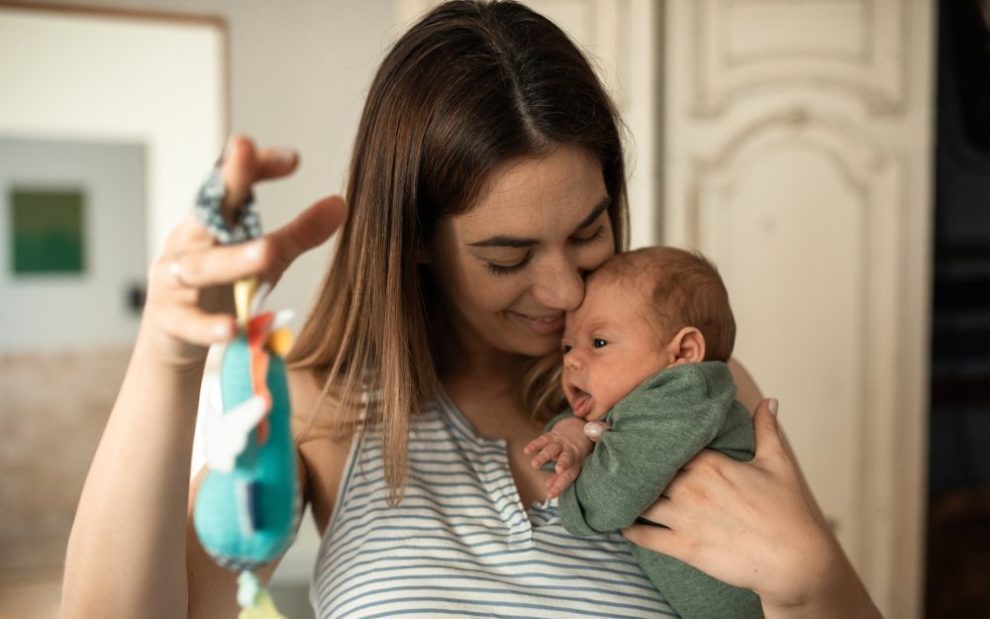During the height of the COVID-19 pandemic, my colleagues at St. Ann’s Center for Children, Youth and Families and I encountered a young woman named Celine. Like many of the women who come to our center, Celine was pregnant and alone with virtually no family members or social networks on which she could rely for support.
Practically speaking, Celine was one of the hundreds of pregnant youth under 24 years old experiencing homelessness in our region that year. To be more accurate, Celine’s adaptive strategies of couch-surfing and motel-hopping meant that she was experiencing so-called “hidden homelessness”—a phenomenon and population that is much harder to see, let alone support.
Celine’s resourcefulness meant she could usually find shelter, albeit temporarily. Paradoxically, this also meant that she was isolated from services and supports designed to reach individuals who are “officially” homeless. Celine did not view herself as someone “experiencing homelessness.” Truthfully, a majority of our clients do not.
When time and resources eventually ran out, Celine was able to connect with our center through a social worker, who shared about Celine’s circumstances and outlined the supports she sought. Celine’s baseline need was to secure safe and reliable housing in time for her baby’s arrival. The other piece of Celine’s story was that she had also experienced significant trauma in her own childhood.
Understandably, Celine preferred not to explore these experiences during her early days with us. Also understandably, she exhibited depression, distrust, and withdrawal during her first months, even upon the arrival of her healthy child.
Celine began to slowly form a trusting relationship with one longtime residential staff member. Having previously experienced abandonment, Celine showed courage in risking this new relationship, which began to blossom. New doors opened in Celine’s life as she gradually realized she was in a safe environment—physically and emotionally.
Celine took more courageous steps, including engaging with our clinical and social work services team, who helped her process the trauma she had experienced. In time, Celine’s innate strengths allowed her to create the safety needed to form a secure and loving bond with her infant. Happily, mom and baby are both now thriving and have transitioned to independent housing of their own.
An epidemic of loneliness
The past few years have been a season of both convergence and isolation. On the one hand, incredibly complex and widespread challenges seem to be intersecting and converging upon us all at the same time. These events have stretched everyone, especially our church, to think beyond the solutions that “worked” just a few years or decades ago.
At the same time everything is converging, it also feels like we are entering a growing age of isolation. Pope Francis has remarked on this rising “epidemic of loneliness” countless times. Despite all our means of connection, we haven’t yet learned how to really connect with one another.
These dynamics of convergence and isolation affect us all, without regard for the demographic categories we sift ourselves into. That said, I want to emphasize how these dynamics particularly affect pregnant women and mothers in our churches and communities—especially women such as Celine, for whom challenges of housing and healing from trauma have converged with COVID-19 and other stressors.
Working alongside moms like Celine, I can no longer unsee the ways that these challenges converge. Like Pope Francis, who has advocated for more concrete, practical support for mothers, I too want to challenge our church (and myself) to prioritize and support maternal mental health moving forward.
The unacknowledged side of motherhood
There can be no overstating the challenges that converged upon pregnant women and mothers over the last three years. Many of these challenges are material. Countless working women became full-time, at-home caregivers through no choice of their own as employers went remote (or eliminated positions) and child care centers closed their doors. Even moms who had already parented from home were stressed by the 2022 infant formula shortage and the spread of RSV (respiratory syncytial virus) among children.
During this time mothers of all socioeconomic statuses struggled, often in isolation, to access what should be basic resources: affordable education for themselves and their children, affordable housing, and living-wage employment. Just as there can be “homelessness” and “hidden homelessness,” we also learned in real-time how invisible stressors such as trauma and mental health challenges afflicted mothers as they met the visible challenges of feeding, educating, and nurturing their children.
One of the blessings of this time (if it’s not too early to count blessings) has been renewed focus on prenatal, postnatal, and maternal mental health—issues long neglected and often dismissed in our society, including our church. These issues affect women of all backgrounds. As such, I believe the universal Catholic community can play an important role as we all learn to honor (and talk about) this previously unacknowledged side of motherhood.
Dorothy Day famously said, “We have all known the long loneliness, and we have learned that the only solution is love and that love comes with community.”
This is what I envision: a community that is curious, concerned, and mutually invested in supporting the mothers among us who experience prenatal, postnatal, and maternal mental health challenges. I am not alone on this journey. Recent excellent work by female writers has helped shed light on these topics, including Kerry Weber’s 2017 article in America on postpartum depression among Catholic mothers.
Similarly, broad-scope organizations such as Catholic Charities USA have spotlighted the role that mental health plays in mothers’ ability to bond and attach with their children. Tellingly, in 2020 Catholic Charities shared that one of the leading risk factors for prenatal depression was “isolation or limited [social] support” during pregnancy.
We honor motherhood in our church and society as a beautiful journey. The reality, as we see clearly now, is far more nuanced and deserving of our attention.
The reality beneath the idealizations
Even mothers who can rely on familial and social supports are “rarely helped in daily life, rarely considered central to society in her role,” said Pope Francis in a 2015 general address. My colleagues and I work closely with young women who do not have the same supports that other moms do: the young mothers who are parenting alone, at young ages themselves, while also trying to determine their own goals for the future. We want to support their goals in any way we can.
But if we take Pope Francis’ words to heart, I think we must also recognize that themes of relationship and belonging are just as integral to a mother’s future—and her mental wellbeing—as the outer achievements and accomplishments she is pressured to meet.
Trauma is a major part of this puzzle. In sharing Celine’s story above, I do not mean to suggest that trauma can be addressed with a one-size-fits-all approach. Rather, Celine’s outcome was the result of her own ability to create trusting relationships, at her own pace, in an environment where she determined she was secure enough to do so.
Such relationships take time—which can be a short commodity when you are a brand-new parent of a tiny human with a litany of material and physical needs. Yet our experiences at St. Ann’s Center show us over and over that in addition to diapers, bottles, and baby formula, our moms are also yearning for solace and genuine connection.
I believe this yearning is something all mothers can relate to, even those with robust social supports. It’s easy to glamorize the mother’s journey. But projecting ideals of motherhood onto women does not help and, in fact, masks an inability to empathize and understand what they are really going through.
“Mothers need to be seen, accepted, and respected,” says my colleague Shaneen Alvarez, director of our clinical and social work services programs. “Moms need dignity, and they need the safety to make choices for themselves.”
Themes of agency and relationship are core to the trauma-informed model of care that Shaneen and our colleague Jeanette Chittams have implemented across St. Ann’s in recent years. This model strives to help mothers heal from old wounds while steadily building emotional resilience that will last long after their time here. The process looks different for each person and can be rocky when mothers occasionally choose not to participate in therapy services based on their culture and/or trauma histories.
But the goal is not for immediate, quantitative improvement. Rather, it is to help the individual woman to flourish, to humbly accompany her while trying to concretize what Pope Francis has called a “culture of encounter” where individuality is fully respected and nurtured within the greater community.
At St. Ann’s Center we passionately celebrate the graduations, promotions, and transitions to independence that our moms achieve for their families. These measurable outcomes are important; yet the heart of the matter is the relationship formed along the way. If we only celebrate the external achievements, something sacred has been lost.
Ongoing work
The work of becoming “people of encounter” is ongoing, reflective, and highly imperfect. Yet I am convinced that we are, all of us, a bit further along the path than we were three years ago. From my viewpoint, we are steadily (albeit slowly) adapting to become the supportive church and society that all mothers deserve.
This Mother’s Day, I encourage you to join me in this vision and this hope and in giving thanks to God for Celine and so many others who show us that healing from trauma is possible. We just need the right convergence of material and mental health supports.
Image: Pexels/RDNE Stock Project














Add comment